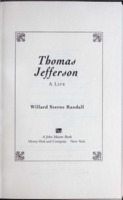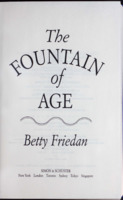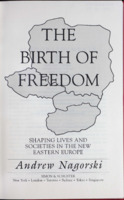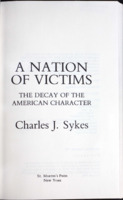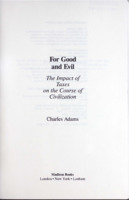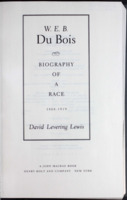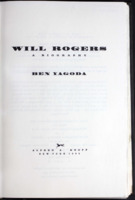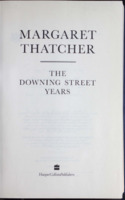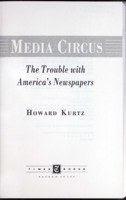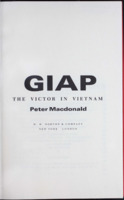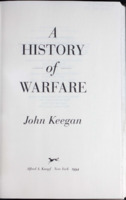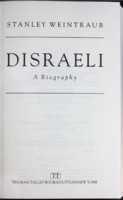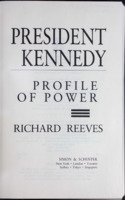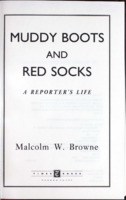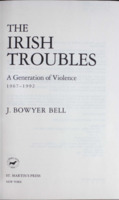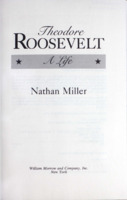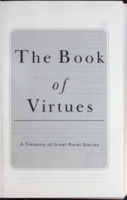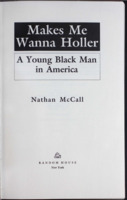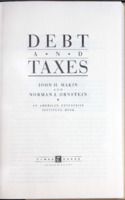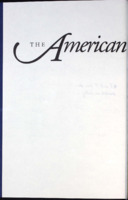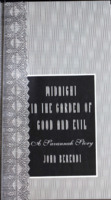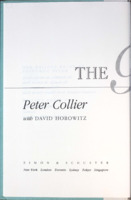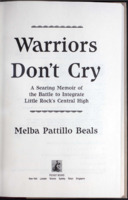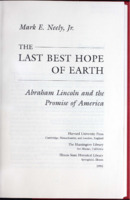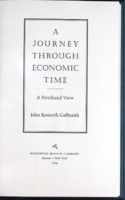Search
728 items
-
Thomas Jefferson : a life
Recounts the public and private life of Thomas Jefferson as well as the age in which he lived. -
The fountain of age
In 1963, Betty Friedan's transcendent work, The Feminine Mystique, changed forever the way women thought about themselves and the way society thought about women. In 1993, with The Fountain of Age, Friedan changes forever the way all of us, men and women, think about ourselves as we grow older and the way society thinks about aging. Struggling to hold on to the illusion of youth, we have denied the reality and evaded the new triumphs of growing older. We have seen age only as decline. In this powerful and very personal book, which may prove even more liberating than The Feminine Mystique, Betty Friedan charts her own voyage of discovery, and that of others, into a different kind of aging. She finds ordinary men and women, moving into their fifties, sixties, seventies, discovering extraordinary new possibilities of intimacy and purpose. In their surprising experiences, Friedan first glimpsed, then embraced, the idea that one can grow and evolve throughout life in a style that dramatically mitigates the expectation of decline and opens the way to a further dimension of "personhood." The Fountain of Age suggests new possibilities for every one of us, all founded on a solid body of startling but little-known scientific evidence. It demolishes those myths that have constrained us for too long and offers compelling alternatives for living one's age as a unique, exuberant time of life, on its own authentic terms. Age as adventure! In these pages, film producers and beauticians, salespersons and college professors, union veterans and business tycoons, former (and forever) housewives, male and female empty-nesters and retirees, have crossed the chasm of age... and kept going. They have found fulfillment beyond career, bonding that transcends youthful dreams of happily-ever-after, and a richer, sweeter intimacy not tied to mechanical measures of sexual activity, but to deep and honest sharing. While gerontologists focus on care, illness, and the concept of age as deterioration, Friedan sets out to separate the complex actualities of biological aging from its pathologies. She distinguishes what is programmed and irreversible from what remains viable and open to choice and transformation. She demonstrates how important to human vitality after sixty is our own control over our lives. She sheds welcome new light on the nursing home specter, the current brouhaha over menopause, and the new intergenerational warfare. She suggests revolutionary ideas about health care, housing, and work and new uses for the wisdom of age in the evolution of our whole society. The Feminine Mystique is universally regarded as the catalyst for the modern women's movement. In The Fountain of Age, Betty Friedan breaks through the mystique of age-as-problem, and proposes a new Movement of women with men, old with young, that will transform our society. -
The birth of freedom : shaping lives and societies in the new Eastern Europe
In The Birth of Freedom, Andrew Nagorski provides an unprecedented personal look at the individuals and issues in the newly free nations of Eastern Europe. He takes readers into the hearts of Poland, Hungary, the Czech Republic, and Slovakia as they undergo the painful yet exhilarating transformation into modern democratic states. As Newsweek's Warsaw Bureau Chief, Nagorski has had access not only to the major figures in the lives of these countries - Lech Walesa, Vaclav Havel, Prime Minister Jozsef Antall of Hungary - but also to the people who will continue to constitute their conscience and soul: writers, poets, artists, clergymen, environmentalists, and blue-collar workers. He examines how former Communists have fared as businessmen, how former dissidents have coped as politicians, and how everyone has struggled to adjust to new, often unexpected roles amid breathtaking change. The upheavals of 1989 in Eastern Europe may have marked the downfall of communism, but they were only the beginning of an even more exciting drama - the conflicts, soaring hopes, and frequent disillusionment that have accompanied the painstaking process of building new societies. Brimming with real-life anecdotes, The Birth of Freedom chronicles the efforts of the Eastern Europeans to claim their place in the new Europe, overcoming not just the political but also the psychological legacy of four decades of subjugation. In these peoples' sometimes exciting and sometimes daunting quest for their new identities, Nagorski has uncovered a spirit akin to that of early America - an exuberance and a belief in principles as these nations turn their ideas of freedom into reality. -
A nation of victims : the decay of the American character
Charles Sykes's ProfScam sparked a furious debate over the mission and the failure of our universities. Now he turns his attention to an even more controversial subject. A Nation of Victims is the first book on the startling decay of the American backbone and the disease that is causing it. The spread of victimism has been widely noted in the media; indeed, its symptoms have produced best-selling books, fueled television ratings, spawned hundreds of support groups, and enriched tens of thousands of lawyers across the country. The plaint of the victim - Its not my fault - has become the loudest and most influential voice in America, an instrument of personal and lasting political change. In this incisive, pugnacious, frequently hilarious book, Charles Sykes reveals a society that is tribalizing, where individuals and groups define themselves not by shared culture, but by their status as victims. Victims of parents, of families, of men, of women, of the workplace, of sex, of stress, of drugs, of food, of college reading lists, of personal physical characteristics - these and a host of other groups are engaged in an ever-escalating fight for attention, sympathy, money, and legal or governmental protection. What's going on and how did we get to this point? Sykes traces the inexorable rise of the therapeutic culture and the decline of American self-reliance. With example after example, he shows how victimism has co-opted the genuine victories of the civil-rights movement for less worthy goals. And he offers hope: the prospect of a culture of renewed character, where society lends compassion to those who truly need it. Like Shelby Steele, Charles Murray, and Dinesh D'Souza, Charles Sykes defines the ground of what will be a significant national debate. -
For good and evil : the impact of taxes on the course of civilization
The very word taxes sends shivers up spines. Yet, very few realize the tremendous impact that taxation has had on civilization. Charles Adams changes that in this fascinating history. Taxation, says Mr. Adams, has been a catalyst of history, the powerful influence if not the direct cause of many of the famous events of history that have marched across the world's stage as empires collided and battled for the right to tax the loser. For Good and Evil is the first book to examine how taxation has been a key factor in world events. Like the Rosetta Stone--a tax document--book sheds light onto much of history. Did you know that biblical Israel split after Solomon's death because his son refused to cut taxes? That Rome rose to greatness due to a liberal tax regime but declined under corrupt and inefficient ones? That in Britain, Lady Godiva made her famous ride as a tax protest? That in Switzerland William Tell shot the apple off his son's head as punishment for tax resistance? Or that Fort Sumter, where the first shots of the Civil War were fired, was a Customs House? Combining facts with thought-provoking comment he frequently draws parallels between tax events of the past and those of the present. Finding fault with the way Western civilization is taxed, Adams provides ideas for curing those faults by using the valuable lessons that history has taught. The special value of this refreshing new look at history lies in the lessons to be drawn by all thinking taxpayers. "Taxes are the fuel that makes civilization run, but how we tax and spend determines to a large extent whether we are prosperous or poor, free or enslaved, and most importantly, good or evil." Once you read For Good and Evil, you'll never feel the same about taxes! -
W.E.B. Du Bois
Bioraphical work on W.E.B. Du Bois by David L. Lewis. -
Will Rogers : a biography
Biographical work on humorist, Will Rogers. -
The Downing Street years
First-hand portrayal of the events, personalities, and critical moments of Thatcher's years in power. -
Media circus : the trouble with America's newspapers
Journalists may have been considered heroes in the days of Watergate, bringing down a president and upholding our country's ideals of truth and justice, but today reporters are seen as a petulant, sleazy, and haughty bunch. Politicians of all stripes routinely bash the media, and the public has endorsed limits on the press that would have been unthinkable a generation ago. One of the handful of reporters who gets any respect these days is Howard Kurtz of The Washington Post. Kurtz's beat is the press itself, and he never lacks for material. Covering one's peers is a perilous task, but Kurtz is universally acknowledged as a scrupulous reporter, as well as a dogged investigator and lucid writer who can get the bottom of any story - especially the story behind the story. His articles are considered required reading in political circles, especially because he is not afraid to take his own paper to task for its misjudgments. There are no sacred cows in Kurtz's world; in fact, the standing joke in the Post newsroom is that people get nervous when they see him approaching, pen and pad in hand. In Media Circus, Kurtz ventures into America's newsrooms and press galleries to show how newspapers have bungled so many of the important stories of recent years. What he sees is not pretty: editors missing the HUD and S&L scandals while showcasing media manipulators like Donald Trump and Al Sharpton; reporters seduced by power at the White House and during the Gulf war; newspaper coverage of William Kennedy Smith and Clarence Thomas sinking into the gutter; the press continuing to shoot itself in the foot, repeatedly sidetracked by trivia and sleaze during the 1992 presidential campaign. Kurtz pulls no punches in reporting how the press has sacrificed its credibility while failing to stem the tide of newspaper closings, and how racial tensions and ethical lapses have become staples of the new newsroom culture. Laying bare the yawning gaps in the information we receive from our daily papers, Kurtz casts a highly critical eye on the work of his ink-stained colleagues. In its depth, scope, and candor, Media Circus rivals the best books written about how newspapers really work, and testifies to Kurtz's skill in reporting from "the belly of the beast." -
Giáp : the victor in Vietnam
A portrait of one of the greatest military commanders of all time--from his early days as a resistance fighter against the Japanese through the brilliant campaigns against the French and Americans that established his reputation. -
A history of warfare
Examines the place of warfare in human culture and the human impulse toward violence. -
Disraeli : a biography
Through the life of Disraeli we see Victorian England--her class system, social intrigues and prejudices, which allowed him to rise to prime minister. -
President Kennedy : profile of power
The author offers a study of Kennedy as crisis manager. He presents Kennedy as neither an amoral playboy nor the ruler of Camelot but a poorly prepared president with mediocre congressional experience. Each chapter presents a different day in the administration--a unique format that effectively reveals how Kennedy responded to simultaneous harrowing issues. The Berlin Wall, the Cuban Missile Crises, Vietnam, and the diplomacy of arms reduction illustrate how Kennedy was constrained by the unshakable Cold War fear of monolithic communism. This approachable investigation of Kennedy's use of power provides a thorough, even-handed review of the Kennedy years. -
Muddy boots and red socks : a reporter's life
A war correspondent recounts his thirty years of experience in the field covering stories all over the globe, from Cuba and Argentina to Vietnam and Saudi Arabia. -
The Irish troubles : a generation of violence, 1967-1992
History of the conflict that has made the term "Northern Ireland" synonymous with bloodshed and disorder for the past quarter century. -
Theodore Roosevelt : a life
As the twenty-sixth president of the United States from 1901 to 1909, Roosevelt embodied the overwhelming confidence of the nation as it entered the American Century. With a fierce joy, he brandished a "Big Stick" abroad and promised a "Square Deal" at home. He was the nation's first environmental president, challenged the trusts, and, as the first American leader to play an important role in world affairs, began construction of a long-dreamed-of canal across Panama, and he was awarded the Nobel Peace Prize for almost single-handedly bringing about a peaceful end to the Russo-Japanese War. In addition to following Roosevelt's political career - from his role as a youthful reformer battling New York City's corrupt Tammany Hall machine to his term as New York State governor to his presidency, in which he established the progressive agenda, to his ill-fated run on the third-party Bull Moose ticket in 1912 - Theodore Roosevelt examines the man as well. This book looks deeply into his personal relations with his close associates and his family, his children, and particularly the two women he married. Theodore Roosevelt presents a three-dimensional portrait of a man of flesh and blood who confronted life-wrenching tragedies as well as triumphs. -
The book of virtues : a treasury of great moral stories
Well-known works including fables, folklore, fiction, drama, and more, by such authors as Aesop, Dickens, Tolstoy, Shakespeare, and Baldwin, are presented to teach virtues, including compassion, courage, honesty, friendship, and faith. -
Makes me wanna holler : a young Black man in America
Examining the complexities of the problems of black youths from an insider's perspective, an African-American journalist recalls his own troubled childhood, his rehabilitation while in prison, and his successful Washington Post career. Reprint. 150,000 first printing. The author remembers his journey from a working class African American neighborhood to prison to a prestigious position on the Washington Post. -
Debt and taxes
No subject arouses - and perplexes - Americans more than debt and taxes. They are agreed about only one thing: they would like to rid themselves of both. It is a fantasy of course, as Benjamin Franklin knew when he observed in 1789 that "in this world nothing is certain but death and taxes." The only certainty Franklin neglected to mention was the lasting controversy that these confounding issues would always provoke.Debt and Taxes is a fresh look at America's budget mess by two of the country's most respected experts. John H. Makin, author of The Global Debt Crisis, and Norman J. Ornstein, an election consultant to CBS News and a contributor to The MacNeil/Lehrer NewsHour, provide a compelling and enlightening history of fiscal policy in the United States. They demonstrate how the political and economic aspects of the problem must be seen in broader patterns of ideology and philosophy. They trace our budget problems from the debate between Jefferson and Hamilton on how our government should work to the surprising struggles to formulate its policy. Most important, the authors examine where our policies are taking us, where they should be taking us, and how we can make our budget process more effective. The purpose of this book is to look behind he popular excitement over debts and deficits and to ask why and how we became entangled in our current predicament; how the fiscal struggles of the 1980s and early 1990s fit into historical patterns of political and economic thought concerning debt and taxes; and how much of the budgetary process is a real problem. Throughout the book, the authors take pains to place the subject in historical perspective. They point out that debate about the moral and political consequences of government debt, the power to tax, and the role of government itself lay behind both the Revolutionary War and the establishment of the republic. Sound fiscal policy was central to the Founding Fathers' philosophical and practical struggle over the direction that the new nation was to take. Debt and Taxes is an eye-opening - indeed, magisterial - account of the origins of the mechanisms of change and the belief in structural reform, of the competition between President and Congress, and of the philosophical and practical continuities, despite real and distinct changes, in public policy on taxing, spending, and debt. It is, as Senator Daniel Patrick Moynihan observes, "a clarifying, liberating book," one that all Americans should read. -
The American presidency : an intellectual history
Historian Forrest McDonald's work on the history of the American presidency . -
Midnight in the garden of good and evil : a Savannah story
Shots rang out in Savannah's grandest mansion in the misty, early morning hours of May 2, 1981. Was it murder or self-defense? For nearly a decade, the shooting and its aftermath reverberated throughout this hauntingly beautiful city of moss-hung oaks and shaded squares. John Berendt's sharply observed, suspenseful, and witty narrative reads like a thoroughly engrossing novel, and yet it is a work of nonfiction. Berendt skillfully interweaves a hugely entertaining first-person account of life in this isolated remnant of the Old South with the unpredictable twists and turns of a landmark murder case. "It is a spellbinding story peopled by a gallery of remarkable characters: the well-bred society ladies of the Married Woman's Card Club; the turbulent young redneck gigolo; the hapless recluse who owns a bottle of poison so powerful it could kill every man, woman, and child in Savannah; the aging and profane Southern belle who is the "soul of pampered self-absorption"; the uproariously funny black drag queen; the acerbic and arrogant antiques dealer; the sweet-talking, piano-playing con artist; young blacks dancing the minuet at the black debutante ball; and Minerva, the voodoo priestess who works her magic in the graveyard at midnight. These and other Savannahians act as a Greek chorus, with Berendt revealing the alliances, hostilities, and intrigues that thrive in a town where everyone knows everyone else." "Midnight in the Garden of Good and Evil: A Savannah Story is a sublime and seductive reading experience. Brilliantly conceived and masterfully written, this enormously engaging portrait of a most beguiling southern city is certain to become a modern classic."--BOOK JACKET. -
The Roosevelts : an American saga
The story of the Roosevelts is usually seen as a tale of two presidents - Theodore and Franklin - who were distant cousins from distinct worlds, separated by time and politics. And of two families - the Oyster Bay and Hyde Park branches - that had little to do with each other. Now comes an explosive new portrait, The Roosevelts: An American Saga, which offers a completely unique view of America's longest lasting and most powerful dynasty. The Roosevelts were one family, an exclusive elite who began their history intimately related by bonds of love and ambition. In this brilliant biography, we see for the first time how the family divided into two branches and began an epic battle for the family legacy. We see for the first time how the ideals of two presidents were passed on to members of later generations, ennobling some and crushing others. The Roosevelts is a rare look at what brought this exceptional group of people together and what drove them apart. In this riveting book we see Teddy, the flamboyant politician and Rough Rider, who was also a "Papa Bear," passing on an ethos of sacrifice and achievement to his "cubs." There is Theodore Jr., the "crown prince," handpicked by his father to carry on the traditions of Oyster Bay but unable to complete the mission. And Alice, Teddy's acid-tongued and fiercely loyal daughter, whose antics became the talk of Washington and who finally became a caricature, raving against her cousin's New Deal and trying desperately to preserve her father's legacy. There's also Eleanor, daughter of Teddy's tragic brother, Elliott, who translated the unhappiness of her marriage to FDR into political activism, eventually becoming First Lady of the World. And finally there is Franklin, always underestimated by Teddy's family, who made an alliance with Eleanor to become the nemesis of the Oyster Bay Roosevelts and, in the web of ironies that bind this family together, a truer heir to Teddy than any of his own children. Filled with drama and anecdote, presenting familiar characters in a penetrating new light, The Roosevelts is a soaring tale of triumph over heartbreak and frailty. But it is also a daunting story of the vanity of human wishes. -
Warriors don't cry : a searing memoir of the battle to integrate Little Rock's Central High
In 1957 Melba Pattillo turned sixteen. That was also the year she became a warrior on the front lines of a civil rights firestorm. Following the landmark 1954 Supreme Court ruling, Brown v. Board Education, she was one of nine teenagers chosen to integrate Little Rock's Central High School. This is her remarkable story. You will listen to the cruel taunts of her schoolmates and their parents. You will run with her from the threat of a lynch mob's rope. You will share her terror as she dodges lighted sticks of dynamite, and her pain as she washes away the acid sprayed into her eyes. But most of all you will share Melba's dignity and courage as she refuses to back down. -
The last best hope of earth : Abraham Lincoln and the promise of America
Mark R. Neely, Jr., provides for the general reader the first compact biography of Abraham Lincoln based on new scholarship. There is no comparable, succinct work on this nation's greatest president. "The Last Best Hope of Earth vividly recaptures the central place of politics in Lincoln's life. In Illinois, Lincoln was an established and prosperous lawyer, married to a refined and educated southern belle, and the father of four boys. Throughout his life, however, politics remained his first love. In Neely's depiction of Lincoln, power was never sought for its own sake. Having triumphed over the hardscrabble circumstances of his youth in Kentucky and Indiana, Lincoln, early in his political career, tied his ambition to the search for solutions to the economic underdevelopment of the American West. And in the last eleven years of his life, Lincoln's political ambitions became yoked to a fierce nationalism and a keen moral purpose - the preservation of the Union and the demise of slavery. Lincoln could not remember a time when he did not hate slavery, or revere the federal system. He made his position clear in the decade leading up to his presidential election campaign, and a civil war erupted." "Through Neely's eyes we see the growth of this president's advanced ideas about military strategy, despite their price in blood; his husbanding of the resources of the home front, regardless of its cost in national treasure; and his complex defense of the Constitution, notwithstanding a momentary loss of civil liberties. We also see Lincoln's steadfast dedication to the Emancipation Proclamation, while the fate of the republic and the future of four million black Americans hung in the balance." "Richly illustrated, nuanced and accessible, written with attention to the age in which Lincoln lived, yet ever alert to universal moral questions, this is a portrait of Lincoln as an extraordinary man in his own time and ours."--BOOK JACKET. -
A journey through economic time : a firsthand view
John Kenneth Galbraith exhibits unmatched insight and broad scope - from World War I and the Russian Revolution to the implications of Communism's fall, from the "superbly insane decade of the twenties" and the Great Depression to the Reagan era and beyond. Whether he is analyzing the advent of Keynesian theory or the end of colonialism and the emergent Third World, Galbraith epitomizes the hindsight and the vision of one who has been an active and outspoken participant in the world's economic history. He writes with authority about the forging of Kennedy's New Frontier and Johnson's Great Society and examines the consequences of the "unintended history of the 1980s." Keenly observed and brilliantly composed, A Journey Through Economic Time is the crowning achievement of a remarkable career, a comprehensive and accessible view of twentieth-century economic and political history that will be read and referred to for years to come.
